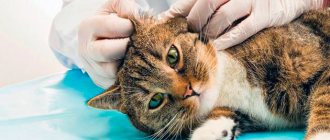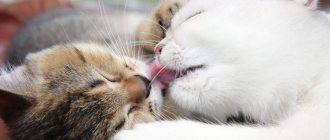If you are a cat owner or simply want to understand cat behavior, one question you may have is why do cats hiss? Most cat owners will attest to the fact that their furry friends sometimes display very unpredictable behavior; one moment you're having a good time, and the next you're caressing a scratch on your arm. Another common behavior is hissing. This is a snake-like voice that felines make to kittens, people, inanimate objects, and even other cats.
Cats have adapted to living indoors or near the house; this is due to certain difficulties that they have to overcome. Socializing with people and other pets is important to them, and vocalization, which can come in the form of hissing, is high on the list. Hissing is not only a sign of aggression; it can communicate different things.
To better understand hissing in cats, we'll start by looking at how the sound is made. We'll also look at eight different reasons why cats feel the need to hiss. Read on to find out more about this strange cat behavior.
Does your cat hiss for no reason?
Aggressive behavior in cats can most often be explained by their intuitive response to external stimuli. Although it is not always possible to answer the question of why a cat hisses at people and whether she has reasons for this. An attentive owner understands the likely cause of the cat's dissatisfaction. Humans and cats have lived together for centuries, and behavioral responses have evolved through the evolutionary process. The cat shows its displeasure with its hissing and is trying to protect itself or scare you.
How to determine if your pet is in an aggressive mood
To avoid conflict with an animal, you need to understand whether it is dangerous or whether it is simply protecting itself. Basic communication skills are necessary for the smooth coexistence of people and pets, and understanding the behavior of cats is necessary for us to live comfortably together with a pet. Tense posture, facial expressions, movements of the ears, tail, paws and characteristic sounds can be a sign of dissatisfaction.
Unacceptable behavior in such a situation can make the cat aggressive, and in some cases it can also affect people.
Warns the owner
If a cat lies on its stomach and at the same time hisses, or even growls, then such behavior should not be regarded as aggression at all. Most likely, the animal senses danger and tries to talk about it. If this behavior lasts for a long time, then you need to take a closer look at the pet and take it seriously. Perhaps something hurts, or the pet is stressed.
the cat became aggressive: why and what to do?
The main causes of a cat hissing are:
- fear;
- unmet needs;
- breed characteristics;
- pain;
- fighting for territory.
Aggressiveness due to fear
This happens when a friendly cat hisses at a certain person. This behavior is most often explained by fear and unpleasant memories of the first contact with him. For example, he might accidentally get up on his feet or be startled by something else. It is possible that the person deliberately intimidated the four-legged pet, depriving it of the opportunity to leave, trying to touch it by force, or holding it forcibly in their arms. The cat views these actions as an immediate threat, so it reacts aggressively and hisses. An animal remembers stress for a long time. But the problem is easily solved with the help of kind words and favorite treats.
Pet hisses at other people
An animal hiss can also be intuitive. If he was not trained as a child and had no human contact, the cat will likely grow up fearful of him. Even tame cats may hiss at a suspicious person, which means they are actively trying to eliminate a potential threat. This is why a cat hisses at other people.
When strangers appear in the house, it is advisable to give the cat a treat, then it will be associated with pleasant experiences, and not with hissing.
Suspicious sounds
A cat may be afraid or wary of unfamiliar noises that we cannot hear, but cats have excellent hearing. (They hear every rustle under the floor or behind the wall.)
A cat will hiss when it sees a threat in various situations:
- careless gesture of the owner;
- visiting a veterinarian;
- the appearance of a stranger or another animal;
- strong sound or scream, etc.
Hissing as a character trait
In some cases, a cat's hissing is a consequence of a manifestation of character. There are breeds of cats that hiss due to their inherent temperament, for example, Siamese.
Representatives of active cat breeds may hiss with insufficient physical activity.:
- egyptian Mau,
- turkish van,
- Abyssinian,
- Cornish Rex,
- oriental and others.
Most furry cats, such as Persians, do not like to be stroked after washing, and hairless cats will become angry if touched with a cold hand. In addition, hairless cats are talkative and their hissing is everyday, not necessarily an expression of aggressiveness.
The cat hisses at its owner
- When a cat hisses at its owner, there is no need to put pressure on him.
- Don't pick him up or force him.
- Let him calm down first.
However, this hissing is not necessarily an expression of aggression; perhaps a frightened animal wants to be calm. Sometimes an animal feels threatened for no apparent reason. In this case, you need to distract the cat and try to calm him down. If he doesn't stop hissing for a long time, you should take him to the vet.
If your cat has hearing problems, she is always alert and easily startled by the sudden appearance or touch of a person. This may also be the reason for her aggressive state.
Dissatisfaction as a cause of hissing
In cats that are being fed, hissing may be a sign of an unmet need. Signs of aggression occur when the owner does not respond quickly to the pet's wishes. An irritated cat will run out and hiss at a person if the cat does not receive food, or does not receive enough attention at its first request. In other circumstances it is a sweet and gentle creature.
This situation is difficult to do anything about, and it is likely that the four-legged furry's behavior is the result of inadequate training.
Hissing as a character trait
In some cases, a cat's hissing is a result of personality. There are cat breeds that hiss due to their innate temperament, such as the Siamese.
If you don't pay enough attention to them, these active cat breeds may hiss:
- Egyptian Mau,
- Turkish Van,
- Abyssinian,
- Cornish Rex,
- Vostochny and others.
Most furry cats, such as Persians, do not like to be wet when being washed, and hairless cats will become angry if touched with a cold hand.
Hissing as a warning
When your cat growls or hisses in a low lying position, make sure the aggression is not directed at you. It's more likely that your cat will alert you to possible danger it senses. If this continues for a long time, pay attention to it.
The cat hisses in pain
If your pet hisses at its owner for no apparent reason, it can be assumed that he is sick or not feeling well, because a cat hissing for no apparent reason is difficult to explain. Your four-legged pet can be irritated by many diseases, such as:
- epilepsy;
- serious poisoning;
- hormonal changes in the body;
- injuries;
- toxoplasmosis and many other diseases.
A sick animal becomes frightened or irritated when a person touches or approaches it. It does not want to be disturbed or afraid of the pain that its owner may cause without knowing it.
Pay attention to body language
Your cat can tell you how she feels, not only by her sounds, but also by her posture. It's important to note what your cat looks like when she growls. An angry or aggressive posture will look like widened eyes, ears up, and an arched back. However, a scared cat will have normal eyes, ears and a tail underneath.
Image credit: Dimitris Vetsikas, Pixabay
While you shouldn't immediately address your growling cat, you can list a few of these different reasons why cats growl and see if they apply to your cat's situation. Then, once you know the reason, you can better calm or comfort her to potentially stop the behavior.
Why does a cat hiss at her kitten?
- Cats are by nature solitary animals that value independence. In the house where he grew up, the cat feels like a master. When another animal appears in the house, especially a dog or its own kitten, it jealously protects its place in the house. This continues until the hierarchy is established.
- Often a four-legged animal offends its owner, not its competitor. The animal in such a situation is aggressive, as evidenced by hissing and frequent tail strikes.
- Aggression in a cat can be caused by the smell of another animal brought from the street.
- A change in environment may also make him aggressive because it disrupts his usual personality.
- There may be situations where the cat identifies itself as the leader of the house and then jealously defends its position out of fear.
- The cat hisses and shows aggression in all possible forms when he touches objects that he considers his own or strangers decide to invade his territory. In such situations, the cat often attacks people.
How to calm an annoying hissing cat
- Leave the cat for a while to restore his mood.
- If another pet appears in the house, keep an eye on it, do not allow it to make contact or fight, let it get used to the new situation.
- If a four-legged cat hisses at a stranger, let him smell his things and let him smell them.
- It's better to ignore the hissing; it's more effective than stroking or screaming.
- Give your cat time and she will gradually calm down.
Animals' behavioral habits depend on their upbringing and how their owners treat them. If she gets enough attention and care from childhood, she will grow up kind and affectionate. Cats never show aggression and never hiss without the presence of stimuli.
See also: why are cats afraid of water?
Causes of aggressive behavior
In fact, there are many reasons to attack or scratch the owner. If a child cuddles and nurses a cat all day long, it is not surprising that the pet will begin to snarl and hiss. Before moving on to solutions, let's look at the roots of the problem.
ATTENTION! Domestic cats do not attack without reason. Aggression can be caused by illness, the nature of a particular breed, or even jealousy.
Character of the breed
Not all cat breeds are equally friendly. Among cats there are people with difficult characters. For example, Siamese, Thai, Russian blue cats. A difficult character makes him jealous of toys, sleeping place, and selective in his contacts with strangers. What can I say, even family members get it from the fuzzy fussy ones.
Excessive importunity, excessive attention, the desire to stroke or sit on your lap often causes the cat to respond aggressively. Favorite toys or litter tray should not be moved and left in the pet's care. At best, the cat will indicate dissatisfaction by hissing; at worst, it will attack the owner.
Protection of offspring
In the first weeks after giving birth, the cat jealously guards the kittens. It is almost impossible to separate your pet from newborns, and any gesture or loud noise can be considered a safety hazard. A cat in the postpartum period is extremely suspicious of uninvited guests and other animals .
But such aggression, caused by maternal instinct, will soon subside. As soon as the kittens open their eyes and begin to walk more or less confidently, the influence of the mother cat weakens. You can fearlessly approach her and even pick up the cubs.
Street past
Some owners bring home cats or kittens straight from the street. But there is no certainty that the previous owners (if any) treated the pets well. Perhaps they ignored him or beat him. If this happened in childhood, the kitten might be left with the idea that all people are cruel and evil.
In addition, only the strongest cats get food on the street. Therefore, it is quite difficult to predict the behavior of a pet even after many years of domestic life.
Wrong games
Many people have a question: why does a kitten attack its legs or bite its hand? The answer lies in playing with your pet incorrectly.
Playing with your kitten is a great idea, but don't overuse open-handed play . The pet bites funny and it doesn’t hurt at all, but with age, when his teeth and claws get stronger, he can seriously scratch him. Simply because he’s used to it and it’s possible. The situation is similar when using other parts of the body when playing with a kitten.
You shouldn’t limit it, but let it play with your hands or feet in doses if you or the children really want to. Even the most capricious cats must understand that the master of the situation is the owner and he has the last word
Interference in the struggle for territory, food
The point is relevant for owners of private houses and summer cottages. Showdowns between your pet and the local cat population will be commonplace. Often it will come to fights for authority, females and territory.
If the owner unexpectedly intervenes in the cats' confrontation, the pet may respond aggressively. At best, the owner will scare away the fighters and they will run away hissing and screaming. At worst, unite with the offender and make the person extreme.
Mature kittens
Cats are very sensitive not only about territory, but also jealously protect their offspring. If the mother shows aggressiveness towards the kittens, then there is a good reason for this :
- She might be sick. There is no milk. The kittens are already teething and they are causing her pain. The kitten is weak, not viable, she does not allow him to have a pacifier so that there is more milk for the rest.
Cats sometimes nurse kittens for up to a year, but most often the maternal instinct lasts for up to six months. After which the mother refuses to feed them, showing that they have already grown up enough and it’s time to cope on their own. You notice that the cat has begun to hiss at her kittens.
No matter how cruel such behavior may seem to a person, it has a good reason. When a cat hisses at her own kittens, this does not mean she is cruel, it’s just that ancient instincts that guide her have awakened in her. You can't punish her for this! A cat's hissing at kittens always has a good reason.
At this moment, the babies must be given to another owner. If you want to keep one of them for yourself, you need to monitor the behavior of your pets, since the mother, emphasizing her primacy in the hierarchy, may be aggressive towards the baby. In this situation, she will not only hiss at the kitten; more aggressive actions are also possible. After a couple of weeks, the cat will calm down, take a position and stop hissing at the kitten.
What should an owner do if a cat bites and attacks?
You can understand what to do if a cat attacks its owner using the reason for its aggressiveness. The problem that arises can be solved by proper education or treatment.
Bring up
Regardless of the reason for the pet’s inappropriate behavior, retaliatory aggression on the part of the owner is unacceptable. Animals respond best to being ignored. If the attack occurs while playing together, demonstratively leave the room and do not come into contact with the cat until it realizes its mistake.
Education begins from the first days of the appearance of a mustachioed pet in the house. If the moment has already been missed, then more time will be required. It is more difficult for adults to overcome established habits than for kittens.
The following recommendations will be useful for retraining your cat:
- Avoid playing with your hands. Reconsider your arsenal of toys in favor of teasing fishing rods and mice that are suitable for displaying the hunting instinct.
- Don’t break away when another conflict arises. Gently remove your hand when the grip loosens and leave the room immediately.
- Buy a scratching post. Make sure the type you choose is suitable for your pet. The scratching post will not only shorten the length of the claws, but will also absorb some of the energy.
- Use a spray bottle. A jet of water is the ideal tool to prevent unwanted actions.
- Get another pet. If the cause of aggression lies in a lack of attention, then an additional playmate will quickly solve the problem.
Be patient. Over time, your efforts will definitely bring results.
Treat
If a disease is detected, the problem is eliminated after it is cured. Prolonged and frequent attacks require a mandatory check with a veterinarian.
A cat with an unsatisfied sexual instinct will have to undergo castration. If you have a mental disorder, you will need long-term drug treatment, but rabies cannot be cured. The patient will have to be isolated in a special box to confirm or refute the disease. A positive prognosis is only possible if you are vaccinated against the virus.
Features of kitten behavior, reasons for growling
Each stage of growing up a pet has its own characteristics, including behavior. A playful kitten, no matter how tame it is, also growls and hisses at other cats, humans, unfamiliar objects, and so on. Due to his age and lack of knowledge about the world around him, he gets scared many times more often than adult cats. In addition, like all children, kittens are very emotional, which is why they often react sharply to any irritants. Therefore, they immediately take a defensive position and begin to growl, hiss, fluffing their fur and preparing to attack or flee.
The main task of the owner of an immature cat is to introduce it to the world around it, teach it to interact with it, distinguish between safe and dangerous places, objects, and living beings. It is imperative to show the kitten that the owner is a friend, trustworthy and a leader who is responsible for him. This must be done gradually, patiently building a trusting relationship, without suppressing the pet psychologically and physically. With proper upbringing, the kitten will grow up to be an affectionate, kind, playful cat.
Imposing your authority on a kitten provokes it into greater aggression, forces it to go on the defensive, and leads to psycho-emotional stress for all participants in the upbringing process. This makes him more aggressive, often growls and hisses, in severe cases he lunges with his claws and fights back.
Thus, it becomes clear that the young cat growls and hisses due to a lack of life experience, timidity, and emotionality. This goes away with age, he becomes calmer and more flexible.











